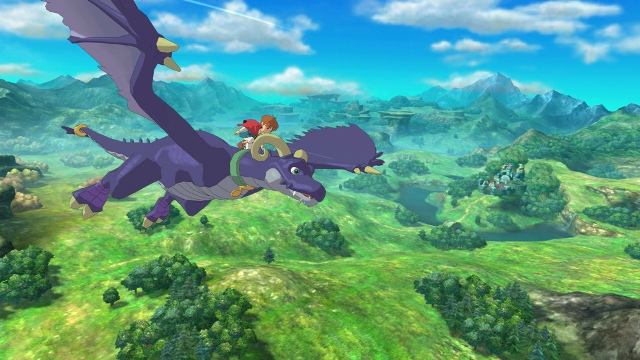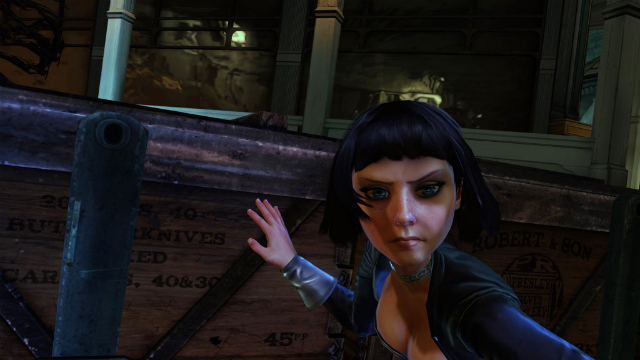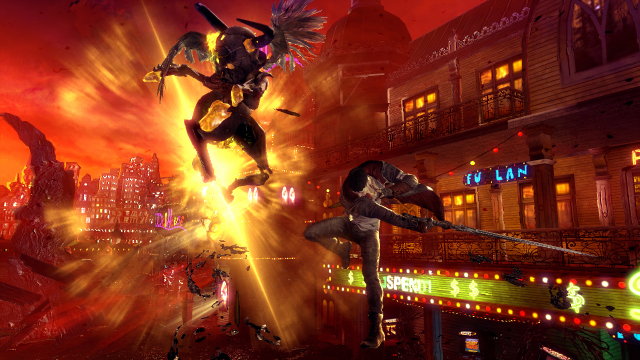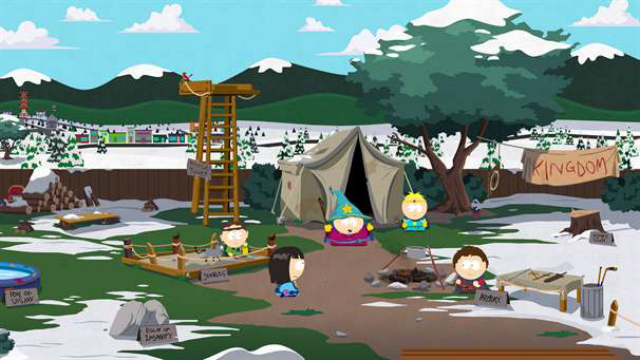The Story Mechanic Part Twelve: The Stories of 2013
I’ve already bought all my Christmas presents. Cards and paper are organised. New decorations are poised and ready to hang from the tree. It isn’t that I like Christmas, though. No, no, no.
I’m budgeting.
I’ve been writing this column for twenty two weeks, coming up on six months, and I’m starting to look into next year to see what games (and therefore columns) I’m going to have to write.
It’s quite a few.
Every year we writers say how it is going to be the best year for games ever. There is always a new console, a new IP, a return to form, a next big thing to make us think that next year might be the best year ever for games. Most years this is quite correct as well. Gamers have never had it so good, and by this time next year the exact same thing will be true.
Whilst it doesn’t automatically follow that just because games get better every year stories get better too, I do believe that 2013 could be a really smashing year for game narrative. 2012 has sown the seeds with The Walking Dead and Far Cry 3, but 2013 is set to build on that in some very exciting ways.
So here, in what is inevitably going to the first part of many, is my preview of the stories of 2013.
Ni No Kuni:
This is the first of two talent bets in this column. Many of the games on this list take a risk with story (Tomb Raider), do something new with an established property (DmC, Gears), or combine technology with story (Bioshock Infinite), but Ni No Kuni gets the nod because I think it will offer a wonderful, whimsical journey of discovery and because the Studio Ghibli seal of approval guarantees a great story experience.

It also gets special mention for its localisation. One of the principal jobs of story in games is that of identification; giving the player context for their actions by explaining who is who and the state of the world. Ni No Kuni is supposed to be a touching story, one about loss, of strength of character and about growing up. The player must, MUST, feel something for the principal characters or that very personal message will fail to resonate. It would have been easy for Level 5 to do an American re-dub and ship the game to the whole English speaking world. However, as this month’s Edge points out, the localisers have taken the time to give Drippy, the main character’s sidekick and principal navigator of the world, a brilliant welsh accent and authentically British dialogue. It is this sort of detail that helps the player “buy” the world and increases the immersion. The deeper you get sucked into a game like Ni No Kuni, the deeper the emotional notes will resonate. That is what will make the story work.
If that is the effort they put into localisation, one can only imagine the love that went into the rest of the game.
Quality is a safe bet.
Tomb Raider:
*drums fingers on the desk … doesn’t know where to start*. How am I squeezing this one into three hundred words?
I feel that Tomb Raider is a “must experience” story next year, just because of how controversial it was before release. Irrespective of whether the game is good or bad, I want to see how they handle the issues the story appears to want to address.

Games, just like books, films and comments in the pub, have the potential to offend and, just as importantly, that doesn’t mean that tricky subject matter shouldn’t be covered just because some people will be offended.
What will be fascinating is how the game deals with its issues. Is it a simple debasement of women? As bad, as a throwaway scene for a trailer? Or is it a mis-judgement that wanted to add depth to a character and went in a poor direction. Could it be none of those things, and rather it is a game that tells a story which addresses challenging issues in a decent, sensible way whilst also telling a fascinating tale. Inevitably the game will offend some, but then so will CoD and Gears of War and Heavy Rain. You will never please everybody, what matters is how sensitively delicate issues are handled and how important they are to the story.
Of all the games in this list, Tomb Raider looks like the most likely to be studied in Game School in 2030. It might be the Straw Dogs of 2013. Regardless, it is a must play and a fascinating title to put on this list.
BioShock Infinite:
We are all waiting for Elizabeth.
It would seem obvious that as a writer I would try and avoid hyperbole. Phrases like “best ever”, “worst ever” and “most exciting since” really have no business in this column. Having said that, I don’t think that games have ever created a convincing NPC partner, one that creates the primary emotional anchor of a story and holds the player in the world. I think that Bioshock Infinite has the potential to achieve that lofty goal and, if Ken Levine’s team don’t quite manage it, they certainly have the potential to do the best job … ever.

When you add the potential of Elizabeth to the plotting pedigree and world building expertise of Irrational Games, it is easy to see the visceral wave of story building on all fronts. A world that demands exploration, who’s facade is creaking under the weight of its own rot, with a plot that weaves between the rusting ironwork and peeling paint. When that world is full of characters that act against and react to the player, guided by the careful hands of Levine and his team, the potential for the Story of the Year to appear in February is easy to see.
Those who have seen the trailers will know there are surprises in store and I suspect that there are more hidden up colonial sleeves. In February 2013 the world will look unto Columbia and stop. It is just how the Founders would want it.
DmC:
I love Ninja Theory games. No one will ever be able to explain to me the degree that both Heavenly Sword and Enslaved were ignored by the gaming public. The reason they are one of my favourite studios is that they never seem to do the easy thing. This is a studio that always seem to learn, always gets better and, as long as people start buying their games, will start producing some honest-to-goodness classics in the not too distant future.

When it comes to Devil May Cry, the strength of the Capcom-developed games was always the gameplay. The story, despite how cool Dante was and is, was always superfluous fluff. That is what makes this game a perfect match. Ninja Theory have a beautiful, refined bedrock of gameplay upon which to show their studios supreme competence: Cinematic storytelling. Ninja Theory appear to have challenged themselves with creating a meaningful mythology for the DmC universe and it appears that they are going to manage it. As gamers, we need to grow up, get past an emo haircut, and give the game a chance.
The most intriguing story idea, for me, is the idea of Limbo. Described in a recent edition of Edge as “a demon blood system that runs through the city” it manifests as the levels themselves trying to hurt Dante. Tying key plot points into the physical behaviour and presentation of the levels is a powerful storytelling tool which has the potential to raise DmC to the next level.
This is grown up game design; iterative, collaborative and adventurous. Hopefully us fans are grown up enough to give it a chance.
Gears of War Judgement:
A nod to the guys at People Can Fly. I try not to write about it in this column, but the Gears series (particularly the shockingly average second game, reviewed as if Epic were sending the game to reviewers with £50 notes in the box) has been a story punching bag of mine for some time.

In a similar way to Ninja Theory with DmC, People Can Fly have been given a solid gameplay grounding and appear to building the game with a more story focussed approach. Eurogamer reported some time ago that a high class writing team (with credits on Avatar and The New Yorker) has been brought in to improve story delivery but it is a simple narrative design choice that makes it stand out to me.
The game is told in flashback, with the player literally playing the story that the Gears team are telling to a judge. The player’s hands act as Baird’s mouthpiece. It is an interesting, original take on story delivery which has the potential to make the player feel real agency in the world if their performance affects the between-level cutscenes. The flip side of that coin, however, is that this is a prequel, so the player won’t be able to get Baird and Cole hung for war crimes, but the potential is there to make the player feel like they are acting on the world.
South Park: The Stick of Truth:
Another talent bet, but the biggest unknown of the lot.
There are two ways to look at the new South Park game. On the one hand, whatever Matt Stone and Trey Parker turn their hands to, they do superbly; their Tony Awards prove that. On the other, game stories have a long history of not being very funny and present the key challenge of interaction to a writer; can even Matt and Trey overcome these obstacles?

I am leaning towards the former because I love betting on talent. Matt Stone and Trey Parker are funny; rest assured this game will make you laugh. Matt and Trey are quality driven; I don’t see this game being bad. However, we know precious little about it. It is a gamble of mine to put it on this list. However, if there is a theme to this column it is that great talent has the potential to produce great games and great stories and few, if any, are as talented at telling stories as Stone and Parker.
Cross your fingers, tighten the hoods on your parkas, this could get exciting.





